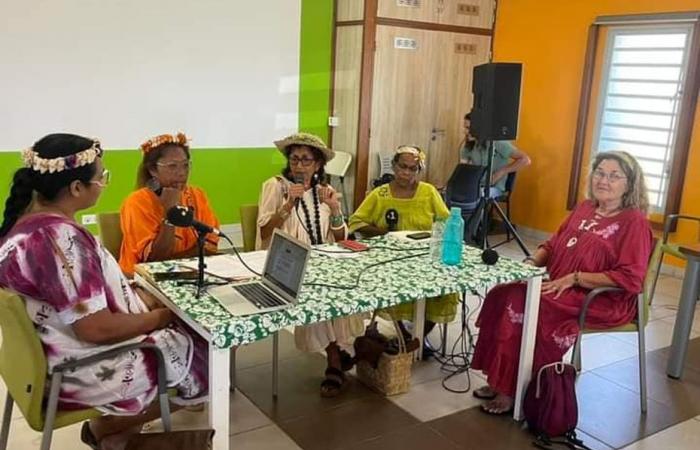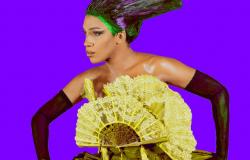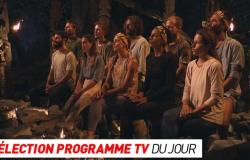In Tadine, during a round table organized by FIFO hors lesmurs, women gave striking testimonies on the recent social unrest in New Caledonia. Education, family structure, political responsibilities: their views, full of pain and hope, shed light on the fractures and the paths to rebuilding “living together”.
“FIFO outside the walls, it’s not just the images, it’s also the words”, It is customary to say Walles Kotra. One of the co-founders of the Oceanian International Film Festival was the host of the first of three round tables, Tuesday November 19 in Tadine. He was served. Scheduled to last two hours, the debates on the words of women and mothers to tell and explain May 13 and its consequences went well beyond the three turns of the dial.
“I bled. I was shaken. I was scared,” begins Bouraillaise Sonia Barket, summarizing what each of the speakers, with their own words, will subsequently express. “The question that events ask us is: we had focused on what brings us together and resembles us; and are we still there? Are there so many things to review?”
At 80 years old, Weane Wadrawane “who also had a lot of trouble” remembers the time “when it was enough to have the school certificate to have a job”. In her thin voice, the one who was responsible for the Protestant women of Maré for nine years believes that the young rioters were asking the question of their place in society. “If it can be used to find solutions, it will at least be a positive point. But education is not only the problem of mothers.”
“Don’t blame us!”responds as if echoing Christiane Trémari, elected representative of the commune of Maré. The one who is completing her 43rd year of teaching has difficulty holding back her tears. “The death of the young man from La Roche… In Maré, the school received children aged 11 to 15 who had participated in the abuses. You have to be crazy to say that we educate our children poorly! We educate with our heart. Dads, help us!”
In charge of the Youth and Sport commission in the Province of the Islands, Isabelle Bearune speaks frankly about the abuses committed in the islands. “Businesses destroyed in Lifou. Abuses in Ouvéa as in Maré, shots fired near the dispensary. What have we done and not done as political leaders? After 40 years of rebalancing, what has happened raises the question of our model of life.” asks the woman who, living in Mont-Dore, talks about her “fear of young people with tattoos”.
Omeyra Naisseline, elected UC-FLNKS and Nationalists of the Province of the Islands in Congress, greatly shares her colleague’s questions on what she calls “a shared responsibility”. From the first days, she was integrated into the crisis unit which tried to organize the repatriations of children and the sick to the islands, “these families who slept in the entrance to the medipole with young children”. More “we keep hope. It is very important to maintain and continue these links, already between us, and also with others”.
A native of Voh, Léonie Warnier employed more than a hundred women on Vavouto until recently. “The factoryshe assures today, was a great innovation but we were unable to support its development. Vavouto developed alcohol”. A timid hope did not leave her however: “What we have experienced over the past thirty years will perhaps help us act on models that we can put in place. We are condemned to live together.”
Discreet at first, the hands are raised. Many mothers from Maré gradually have a few things to say. They take turns launching. One speaker questions the increasing difficulty in educating, regretting the fact of no longer being able to “cphysically correct the children, who benefit from it. The family structure is at the heart of the public’s discussions. Sonia Barket’s observation: “the family structure of the islands is not necessarily as strong on the mainland.”
Danielle Guaenere asks for the floor in turn. The advisor to the President of the Government, Louis Mapou, establishes the implacable accounting and material assessment of the abuses, before launching into a more personal analysis. “It must be said, we lived beyond our means. And what have we done since then? We find ourselves with a societal model that does not resemble us. Concerning the education system, everything cannot be thrown away, we must continue to work.”
Danielle Guaenere asks for the floor in turn. The advisor to the President of the Government, Louis Mapou, establishes the implacable accounting and material assessment of the abuses, before launching into a more personal analysis. “ It must be said, we lived beyond our means. And what have we done since then? We find ourselves with a societal model that does not resemble us. Concerning the education system, everything cannot be thrown away, we must continue to work. On the other hand, when we present ourselves in front of young people who are not aware of extreme solgans we have to take responsibility.”
On the other hand, when we present ourselves in front of young people who are not aware of extreme solgans we have to take responsibility” says Danielle Guaenere).
Farah Caillard returns to “the absence of fathers” and calls back to explain what she “does not call for a crisis, but a logical evolution” of colonization that “33% of Kanaks live below the poverty line compared to 8% for the others. Where is the rebalancing?”
Speaking at the end of the session, Océanue Trolue takes the audience to his office. “When I see them coming with tattoos on their faces,” said in a serious tone the one who takes no pride in being “the second Kanak judge”I take it upon myself.” “When I look around each person, I understand. The people I meet there are us. We must all work where we are, to build our self.”






